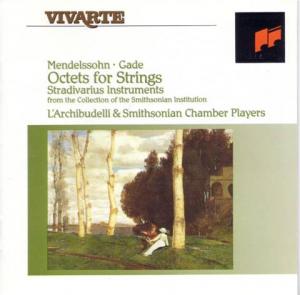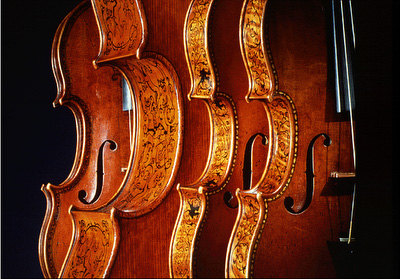- Home
- About
- About SCMS
- Directors
- Artists
- Vera Beths
- Steven Dann
- Marc Destrubé
- James Dunham
- Mark Fewer
- Eric Hoeprich
- Christopher Krueger
- Myron Lutzke
- Marilyn McDonald
- Douglas McNabney
- Mitzi Meyerson
- Pedja Muzijevic
- Anca Nicolau
- Jacques Ogg
- Loretta O'Sullivan
- Lambert Orkis
- Paolo Pandolfo
- William Purvis
- Marc Schachman
- Jaap Schröder
- Andrew Schwartz
- William Sharp
- Ian Swensen
- Lucy van Dael
- Ensembles
- Concerts
- The Collection
- Recordings
- Education
- Donate
Felix Mendelssohn: Octet in E-flat Major, Op. 20; Niels Gade: Octet in F Major, Op. 17
The Smithsonian Chamber Players and L’Archibudelli (Vera Beths, Jody Gatwood, Lisa Rautenberg, & Gijs Beths, violins; Steven Dann & David Cerutti, violas; Anner Bylsma & Kenneth Slowik, celli)

Winner of the 1993 Diapason d’Or [France’s coveted “Golden Tuning Fork” award]
Winner of the 10 de Répertoire prize (Paris)
It is astonishing that Mendelssohn’s Octet was written by a boy of sixteen, not because juvenile compositions are so rare, but achievements of both personal character and artistic technique are so evident in the piece that it would be a great accomplishment for a man of any age. Mozart, even more celebrated for his musical precocity than Mendelssohn, composed at an earlier age, but produced nothing by his teens that bears the stamp of such maturity and originality as this Octet . . . The Danish composer Niels Gade is usually remembered today in connection with Mendelssohn (whom he succeeded as director of the Leipzig Gewandhaus Orchestra upon the latter’s death in 1847), although Gade’s music reveals not only other influences, notably Schumann’s, but a personal style that is already evident in his earliest surviving works. Nevertheless, Gade’s Octet (1848) is the composition in which his debt to Mendelssohn is probably most obvious. The instrumentation and formal plan that his piece shares with Mendelssohn’s masterwork make Gade’s Octet, even in the absence of a dedication, and homage, yet it is not that of a youthful imitator but of a mature artist with important and highly individual compositions behind him.
—from Jon Newsom’s liner notes

The Smithsonian’s decorated Stradivarius instruments used in this recording
Listen to the Scherzo from the Mendelssohn Octet
A unique attraction of this recording is its use of eight Stradivarius instruments. But, however fabulous, these instruments breathe their full magic only in the hands of virtuosos worthy of them. This is clearly the case with the members of this excellent ensemble, which unites players from L’Archibudelli, animated by Anner Bylsma, and the Smithsonian Chamber Players, led by Kenneth Slowik. Propelled by a youthful spirit, their reading of Mendelssohn’s famous masterpiece has a jubilant virtuosity that borders on the miraculous. If the choice of gut strings diminishes the volume of sound very slightly, it only emphasizes the unheard-of richness of the timbres of these exceptional instruments, while the fabulous precision of the interpreters’ articulation allows them to dare tempi of thrilling rapidity and lightness. In this regard, their vision of the famous Schrzo, leaping and spinning music of the elves, is a dazzle that fades away “with the lightness of a feather,” leggierissimo . . .
—Diapason (Paris)
On this album:
Felix Mendelssohn (1809-1847)
[1]–[4] Octet in E-flat Major, Op. 20
Niels Gade (1817-1890)
[5]–[8] Octet in F Major, Op. 17


